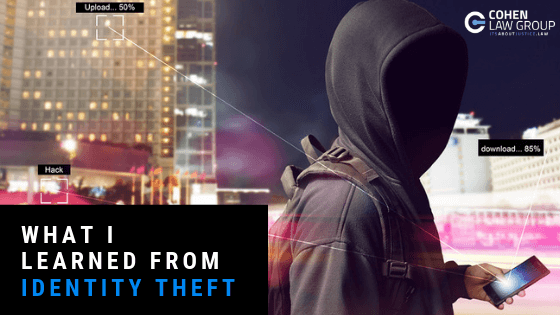What I Learned From Identity Theft
Like more than 9 million other Americans this year, I have joined the panicked fraternity of phone hack identity theft victims. I was lucky, my bank was able to isolate the unauthorized activity rather quickly and send me a shocking 1:00 AM text message asking if I really bought $208.35 worth of Whoppers at the Burger King in Miami.
It seems that earlier that evening while enjoying a sidewalk café, a passerby was able to access my phone through my wifi connection and download everything.
Think about what that means.
What’s stored in your phone? Your Amazon password, your bank information, your ITunes account, and at least for me…every credit card I own. Is your mother’s maiden name in there somewhere? What about your social security number?
These criminals can create an entire identity around you in minutes without you finding out until the unpaid bills start coming in.
In my case, they were able to program a physical credit card with their real name on the front, but my information on the strip. If it wasn’t for an eagle-eyed server at a popular bar in Miami noticing that the name on the receipt and the name on the card didn’t match, my situation would have been a whole lot worse.
Banks are very good at catching credit card fraud. Suppose your “chip card” is used in Orlando, and twenty minutes later a swipe is made at a gas station in Miami. That’s going to send up a digital red flag at the bank probably triggering an automatic text, voicemail, or email to check if things are okay.
Rule Number One
Call the bank back right away, but remember to be hyper-vigilant. Unless you, for some reason, recognize your bank’s fraud protection phone number, don’t just start answering their questions about your mother’s maiden name or your social security number.
Criminals will try to get the last pieces of your security puzzle from you directly. Banks will never ask for your social security number over the phone (except maybe the last 4 digits). Give them only what they need to know to open your account and then let them tell you about your last purchases. If they know the frauds and the legitimate ones, you know you are talking to the real deal.
Rule Number Two
The next thing is to contact a credit bureau – Experian, Trans Union, Equifax – and put an alert on your identity.
Any one of them will do the job for all three as they are required by law to report to each other about such alerts. This will tell the bureaus to contact you directly if any new credit is attempted using your identity for 90 days or up to a year if you choose.
Another Option
You can also freeze your credit altogether which makes it impossible to open any new credit. You can cancel the freeze at any time, but even you can’t get a new card when doing so.
Freezing requires you to contact each credit bureau individually. I recommend subscribing to a credit monitoring service for at least a few months, but stick to the names you know. Credit Karma, CreditReport.com, or consult your personal bank.
These websites also maintain the most up-to-date privacy strategies so be sure to check out the latest thing while you’re there.
Finally, a few tips on not getting hacked in the first place.
1. Turn your phone’s Wi-Fi and Bluetooth off unless you know you’re in a safe location and you know the source.
2. Keep your phone out of site. Don’t let it sit on your table while you’re eating or having drinks. I know we all like to see when that text gets answered, but that’s the risk you take.
3. Have your phone lock as soon as practical. It’s annoying to have to type your code a thousand times a day, but there is a reason it’s there.
4. Get a credit monitoring service. There are dozens on the web, but stick with a name you know.
5. Turn off autocomplete so your mailing address or password don’t automatically give away the store.
6. Regularly clear your browsing history especially cookies and caches… yeah… just do it.
7. Never access your bank, Amazon, Itunes, or any sensitive site on public wifi. In fact, just assume you are being watched every time you use public wifi.
Every new technology is going to create a new criminal to exploit it. Create a few good habits in yourself, teach them to your kids, and maybe we can make it just a little harder to exploit us.
COHEN LAW GROUP
DISCLAIMER: This website is for informational purposes only and does not provide legal advice. Please do not act or refrain from acting based on anything you read on this site. Using this site or communicating with Cohen Law Group through this site does not form an attorney/client relationship. This site is legal advertising. Please review the full disclaimer for more information by clicking here.

